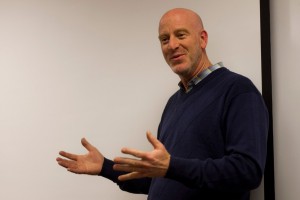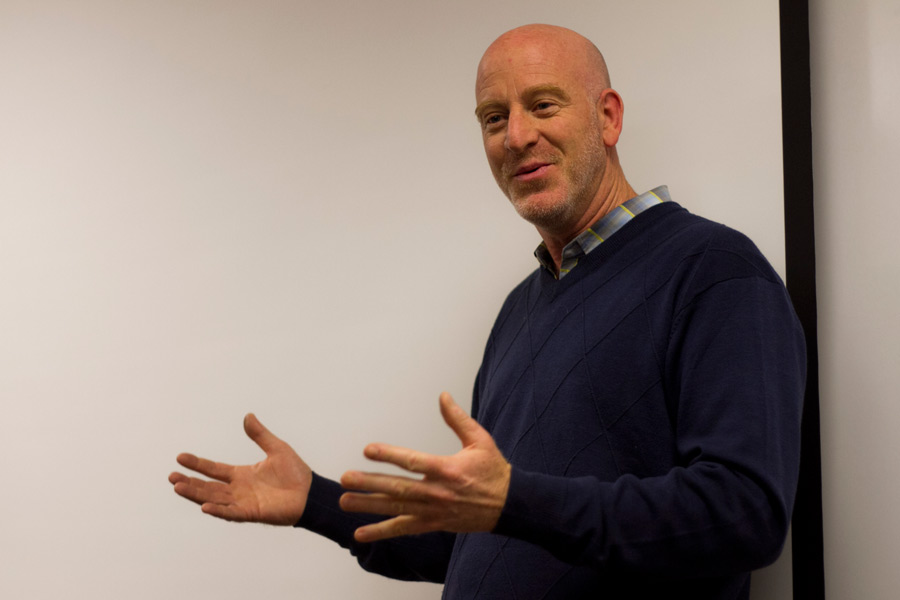Driver speaks to students
At a small gathering of auto enthusiasts in Waite Phillips Hall, Amir Rosenbaum, one of 12 people to break the 400 mph land speed barrier, spoke about his experience building and driving racecars. The event was hosted by the USC Auto Club.

Fast and Furious · Land-speed race record-holder Amir Rosenbaum met with students Tuesday night to discuss his racing career and his experiences in the auto industry in Waite Phillips Hall. – Liliana Scarlet Sedano | Daily Trojan
“It’s good to be passionate about something, it makes you a better person,” Rosenbaum said. “But if you’re passionate about cars, that’s even better.”
Rosenbaum’s interest in cars started early; he began making car sounds and saying car names at 9-months-old. He waited until his 16th birthday to get his license, but got his first speeding ticket at noon on the same day.
“At one point, I had 13 speeding tickets in a 37-month period,” Rosenbaum said. “I lost my license. I still drove.”
After holding a series of odd jobs including amateur gold mining, Rosenbaum eventually founded an auto parts company, Spectre Performance, that is now a multimillion-dollar business selling parts to auto enthusiasts.
Rosenbaum began his racing career at the Virginia City Hillclimb in Nevada, a two-lane mountain road where he set the all-time record in 2002 in a Ferrari F-40. He then set his sights on a land speed record, but after realizing he couldn’t do it in the F-40, he decided to build a new car. He ended up using a modified “streamliner,” a 39-foot long vehicle just wide enough to fit the driver, with a 1970 Cadillac big-block engine bought from a junkyard for $100.
“Air behaves differently at supersonic versus subsonic speed,” he said. “Most people think they need to build their car like a jet-fighter, but we decided to stick with the traditional Boeing model — more like a raindrop.”
Rosenbaum also spoke about what it was like to drive at over 400 mph and said that at that speed the conscious brain can’t function. Rosenbaum ended up having to rely on a series of LED lights to tell him when to shift gears.
“Some of the older guys told me that I wouldn’t be able to count to four that fast,” he said. “I didn’t believe them, but it’s true; at that speed you can’t count.”
Rosenbaum said that the conscious brain takes in three degrees of the 180 degrees in a normal human field of vision while the subconscious brain handles the rest. He used the example of being able to glance at a text while driving on the highway and not losing control of the vehicle, or how time can sometimes seem to pass more slowly when humans sleep. He said that people should be aware of the power of the subconscious brain and utilize it in their daily lives.
“The job of the conscious brain is to tell the subconscious brain what to do,” he said. “All athletes and other high-performing individuals work this way.”
Students responded to the event enthusiastically and found the anecdotes Rosenbaum shared engaging and informative.
“It’s almost indicative of a different era, how he grew up versus how we grew up,” said John Hu, a junior majoring in economics. “I wonder if we can even do the things that he did.”
Aaron Bajor, president and founder of the USC Auto Club, said it was an honor to host a speaker such as Rosenbaum and said he hoped it would increase awareness about the club, which has grown to almost 200 members.
“USC is a great school, but there aren’t a lot of opportunities for people interested in the automotive field,” said Tyler Makin, a senior majoring in business administration. “It’s great to see those horizons expanding.”


Thanks for the write-up! Awesome event, hope to see more people at events moving forward! Check out our website to learn more about the club